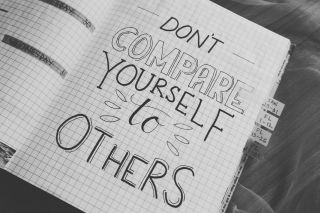Stress
Have You Become Your Harshest Critic?
The counterproductivity of comparing yourself to others.
Posted April 24, 2023 Reviewed by Vanessa Lancaster
Key points
- Although high-achieving women excel at most things, it doesn't mean they need or should expect themselves to excel at everything.
- Overusing the word should in your internal dialogue is a quick way to go from healthy self-comparison to becoming your harshest critic.
- When overusing "should" with yourself, try to reverse gears, reduce, rest, repeat, reflect, and rely on others.

At a recently attended party, a friend asked, "Do you feel as inadequate as I do?" referencing the host. "She cooked everything on that buffet, the house is spotless, and I just heard her say she made all the decorations herself. In my wildest dreams, I couldn't begin to compare."
"Dream?" I said. "More like a nightmare if you ask me."
"Why?" she asked. "Wouldn't you like to be able to pull off something like this?"
"No," I answered. "And neither would you. You barely can stand going to the grocery store for milk."
My friend reflected for a moment and laughed. "Yeah, you're right. It just seems like it's something I should be able to do."
"Seems like something I should be able to do" is an all too familiar script in the minds of many high-achieving women, one that unfortunately adds unnecessary stress to their already busy lives. Although high-achieving women excel at most things they put their minds to, it doesn't mean they need or should expect themselves to excel at everything. Yet that's exactly what happens when counterproductive comparisons enter the picture.
Just because you're not "as good at" or aren't inclined towards things others seem to have a flair for doesn't mean you're inadequate. Or bad. Or unworthy. Or whatever negative adjective you'd like to fill in unless you allow yourself to define it that way.
I, for one, have never been domestically inclined, so much so that I refer to myself as "domestically challenged." Thankfully, though, I don't feel guilty about it, embarrassed by it, or at all interested in changing it, despite having several high-achieving friends who are domestic goddesses. Whenever someone suggests that I "should" be more domestically inclined, I simply say that my superpowers lie elsewhere.
However, being comfortable with this kind of noncomparative thinking didn't come easy, and it didn't come overnight. Social comparison is an innately human tendency. Starting as early as infancy, it's how we learn about and come to agree on appropriate behavioral norms. It's how we assess our strengths and weaknesses to successfully navigate the complexity of social interactions (Baldwin & Mussweiler, 2018).
However, as with all things human, healthy and adaptive social comparison has limits. They're adaptive when comparisons are used for positive growth, such as enhanced performance, better decision-making, or general self- (or species-) improvement. They can help you feel good about yourself and your fellow humans. However, when comparisons turn negative and become a source of shame and self-condemnation, they can quickly turn from being a source of energy and motivation to a source of stress and anxiety. In short, they become counterproductive.
Maria Stenvinkel is a blogger who often writes about her struggle with counterproductive comparisons. After she decided to leave a secure corporate job and rebuild her career from scratch, she wrote, "Comparison is generally the fast track to unhappiness. It’s a recipe for misery. All it does is keep you focused on what you don’t like about yourself and your life." She noted that one of the biggest contributors to counterproductive comparisons is when people start "should-ing" themselves (e.g., "I should be more successful," "I should be able to take on more responsibilities.").
Overusing the word should in your internal dialogue is one of the fastest ways to go from healthy self-comparison to becoming your harshest critic. As fellow Psychology Today blogger Suzanna Newsonan explained, "Should indicates that there is a specific, correct way to do things. This is not true. No one can tell you what you should do or how you should live your life, or who you should be or become. Just like you can't tell anyone else that either. Why? Because there is no one correct way to live life." She went on to note that should is a "shame-based" internal comparison that "creates stress and anxiety in your body and mind" through its implication that you aren't working hard enough or aren't good enough.
So how can you turn this innately human tendency around?
- Reverse gears. Instead of using valuable time and energy comparing yourself to others, use that time and energy on what you do enjoy, where you want to be, and/or how you're going to get there.
- Reduce, reset, and replace. Make it a goal to reduce the use of I should in your vocabulary and replace it with I want, I can, and I will. In this way, you're practicing removing a negative, nonmotivating, and stress-inducing word from your internal (or external) dialogue and replacing it with positive, motivating, and energy-generating words.
- Reflect. No one is perfect. Sometimes, when your best-laid reverse, reduce, reset, and replace efforts fail, you drift off course, and you find "I should" creeping back into your dialogue. When this happens, don't be afraid to reflect and ask yourself, "Why?" For example, if you find yourself thinking, "I should be thinner," challenge yourself to find positive, noncomparative reasons for what you're trying to achieve (e.g., I want to be healthier; I want to feel better about myself; I will be physically more competitive in [tennis, running, you fill in the blank]) rather than negative, disempowering reasons that are unproductive and add to your stress levels (e.g., all of my friends are thinner than I am; my family/friends think I'm fat). As Newsonan pointed out, negative comparative reasons for "why" are nonmotivating, whereas positive empowering reasons are and, therefore, will bring you closer to what you actually want to accomplish.
- Rely on others. If you're "should-ing" yourself, you can bet your friends and coworkers are doing the same. In fact, after reading this post, you might even discover that you belong to a group where "should-ing" is so pervasive that it's become its own group mentality. Counteract this kind of negative group thinking by relying on each other. Form a group pact that when someone in the group hears another group member "should-ing" herself, do a group intervention by gently pointing it out and suggesting she try some of the more positive and empowering strategies above. Sometimes, it takes a village.
References
Baldwin, M. and Mussweiler, T. (2018). The culture of social comparison | PNAS
Newsonan, Suzanna. (May 30, 2022). Why No Good Comes from the Word “Should” (Psychology Today)
Stenvinkel, Maria. (N.D.) 13 Things to Do Instead of Comparing Yourself to Others (tinybuddha.com).


